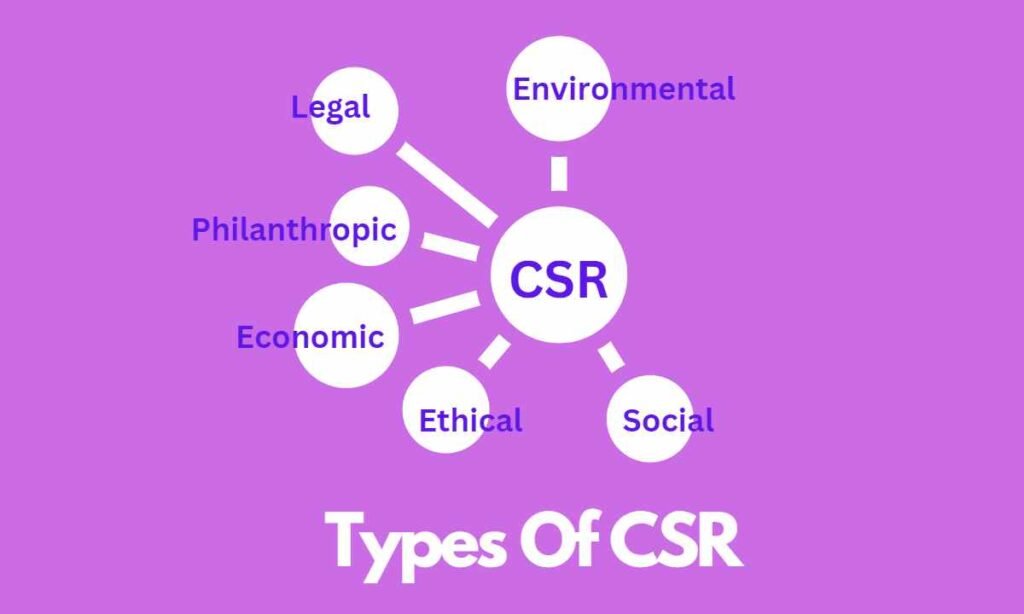Corporate Social Responsibility (CSR) has become an increasingly important topic in the world of business. Companies that are socially responsible are not only doing their part for the environment and society, but they are also benefitting from it. In this blog, we will discuss the meaning of Corporate Social Responsibility, its benefits, and the different types of CSR initiatives that companies can take. CSR is the most important part of business ethics.
As consumers become more socially conscious, companies that prioritize CSR are gaining a competitive advantage. In fact, a study found that 66% of consumers are willing to pay more for products and services from companies that are socially responsible. Furthermore, companies that prioritize CSR initiatives often have higher employee engagement and retention rates, as employees feel proud to work for a company that is making a positive impact.
Define Corporate Social Responsibility
Corporate Social Responsibility (CSR) is a business approach in which companies take responsibility for their impact on society and the environment, beyond their legal obligations. It involves a commitment to act ethically, and contribute to economic development, while also improving the quality of life of employees, their families, the local community, and society at large.
By doing so, companies aim to make a positive impact on the world while also improving their bottom line. CSR initiatives can include philanthropy, community volunteering, environmental sustainability, ethical labor practices, and more.
Meaning of CSR
In simple terms, Corporate Social Responsibility (CSR) refers to a company’s commitment to operating in an ethical, sustainable, and socially responsible manner. This means that companies are not only focused on making profits, but also taking into account the impact of their operations on society and the environment.
CSR involves a range of activities, such as adopting sustainable practices, reducing environmental footprint, promoting fairness and equality, addressing social issues, complying with laws and regulations, and engaging in philanthropic activities. The ultimate goal of CSR is to create value for society and the environment while also enhancing the long-term success and reputation of the company.
Importance of Corporate Social Responsibility

1. Enhanced brand reputation
Corporate Social Responsibility initiatives can help companies establish a positive brand reputation and be seen as socially responsible. This can lead to increased customer loyalty and trust, and ultimately contribute to long-term business success.
2. Attract and retain talent
Companies that prioritize CSR initiatives can attract and retain top talent by providing a positive work environment and showing that they care about their employees. This can lead to improved employee morale, motivation, and productivity.
3. Increased profitability
CSR initiatives can improve a company’s bottom line by reducing costs, increasing efficiency, and attracting new customers. For example, implementing sustainable practices can lead to cost savings in energy and resource usage, while also attracting customers who value environmental responsibility.
4. Improved stakeholder relation
CSR initiatives can help build positive relationships with stakeholders, including employees, customers, suppliers, and investors. This can lead to increased loyalty, trust, and support from these groups.
5. Mitigation of risk
By implementing CSR initiatives, companies can reduce their exposure to legal, financial, and reputational risks. For example, by implementing ethical labor practices, companies can reduce the risk of lawsuits and negative publicity related to labor violations.
6. Increased innovation
CSR initiatives can inspire creativity and innovation within a company, leading to the development of new products, services, and processes. For example, by prioritizing environmental sustainability, companies can develop new products and services that are environmentally friendly and appeal to eco-conscious consumers.
7. Better community relations
CSR initiatives can improve a company’s relationship with the local community by addressing social and environmental issues that impact the community. This can lead to increased goodwill, support, and trust from the community.
8. Reduced environmental impact
By implementing sustainable practices, companies can reduce their environmental footprint and contribute to a healthier planet. This can include reducing greenhouse gas emissions, minimizing waste, and conserving natural resources.
Similar Topic:: Fostering Corporate Social Responsibility
9. Improved supply chain management
Corporate Social Responsibility can help ensure ethical and sustainable practices throughout a company’s supply chain. This can include working with suppliers who prioritize ethical labor practices, reducing waste and environmental impact in the supply chain, and ensuring fair and transparent business practices.
10. Contribution to society
CSR initiatives allow companies to make a positive impact on society by addressing social and environmental issues and giving back to the community. This can include philanthropic initiatives, volunteering, and community outreach programs. By contributing to society, companies can improve their public image and build positive relationships with stakeholders.
Read Similar: Difference between ethics and morals
Types of Corporate Social Responsibility

Types of Corporate Social Responsibility are also known as the functions of corporate social responsibility.
1. Environmental Responsibility
This type of CSR involves a company’s efforts to minimize its impact on the environment. This includes reducing carbon emissions, conserving natural resources, and using sustainable practices. Companies may also work to reduce waste, recycle materials, and adopt renewable energy sources. By taking steps to address environmental issues, companies can reduce their environmental footprint and contribute to a more sustainable world.
2. Social Responsibility
This type of CSR involves a company’s efforts to address social issues such as poverty, education, health, and human rights. Companies may do this through charitable donations, volunteer work, or partnerships with nonprofit organizations. For example, a company may support a local food bank, sponsor a youth sports team, or provide funding for medical research. By addressing social issues, companies can make a positive impact on the communities where they operate.
3. Ethical Responsibility
This type of CSR involves ensuring that a company’s actions and practices are ethical and align with societal values. This includes being transparent with stakeholders, promoting fairness and equality, and upholding human rights. Companies may also adopt ethical codes of conduct and anti-corruption policies to ensure that they operate with integrity. By practicing ethical behavior, companies can build trust with stakeholders and maintain a positive reputation.
4. Economic Responsibility
This type of CSR involves a company’s obligation to be profitable and contribute to economic growth. Companies may do this by creating jobs, investing in local communities, and supporting small businesses. By contributing to the local economy, companies can help to create a more prosperous and stable society.
5. Legal Responsibility
This type of CSR involves complying with laws and regulations. Companies must ensure that their operations and products are safe and meet legal requirements. For example, a food manufacturer must comply with food safety regulations to ensure that its products are safe for consumers. By complying with laws and regulations, companies can avoid legal issues and maintain a positive reputation.
6. Philanthropic Responsibility
Philanthropic responsibility is also a type of CSR that involves charitable giving and community involvement. Philanthropic responsibility goes beyond the legal and ethical requirements of a company, and instead focuses on voluntarily giving back to society. This type of CSR includes activities such as donating money or resources to charitable organizations, sponsoring events or initiatives that support the community, and encouraging employee volunteerism.
Philanthropic responsibility is important because it allows companies to make a positive impact on the communities where they operate. By donating resources and supporting charitable causes, companies can help to address social issues and improve the quality of life for people in need. Philanthropic responsibility can also help to enhance a company’s reputation and build goodwill with customers, employees, and other stakeholders.
Trending Topic: Business Ethics For Entrepreneurs
In conclusion, corporate social responsibility (CSR) is a crucial aspect of modern business operations. It involves a company’s commitment to operating in an ethical, sustainable, and socially responsible manner. The different types of CSR, including environmental responsibility, social responsibility, ethical responsibility, economic responsibility, legal responsibility, and philanthropic responsibility, allow companies to create value for themselves and for society as a whole.
FAQs
1. What is corporate social responsibility?
Corporate social responsibility (CSR) is the practice of companies voluntarily taking into account the social and environmental impact of their operations and decisions. It involves a company’s commitment to operating in an ethical, sustainable, and socially responsible manner.
2. Why is CSR important?
CSR is important because it allows companies to make a positive impact on society and the environment. By addressing social and environmental issues, companies can enhance their reputation, build trust with stakeholders, and contribute to a more sustainable and equitable world.
3. What are the different types of CSR?
The different types of CSR include environmental responsibility, social responsibility, ethical responsibility, economic responsibility, legal responsibility, and philanthropic responsibility.
4. How can companies implement CSR?
Companies can implement CSR by adopting sustainable practices, reducing their environmental footprint, addressing social issues, being transparent with stakeholders, promoting fairness and equality, complying with laws and regulations, and engaging in philanthropic activities.
5. What are the benefits of CSR?
The benefits of CSR include enhanced reputation, improved brand image, increased customer loyalty, better employee engagement, reduced risks, and a positive impact on society and the environment.
6. How can CSR be measured?
CSR can be measured through various metrics, such as carbon emissions, social impact assessments, stakeholder engagement, employee satisfaction, and financial performance.
7. How does CSR relate to sustainability?
CSR and sustainability are closely related, as both involve a company’s commitment to operating in a sustainable and socially responsible manner. CSR focuses on a company’s social and environmental impact, while sustainability involves meeting the needs of the present without compromising the ability of future generations to meet their own needs.
8. Is CSR mandatory?
While CSR is not mandatory, many companies choose to engage in CSR activities voluntarily as part of their commitment to social and environmental responsibility. Some countries and industries may also have regulations or guidelines related to CSR.


Leave a Reply